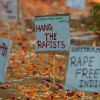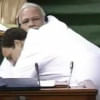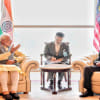Hate speech by Indian VIPs on the rise: Study
Indian top politicians have increasingly, by 490% to be exact, used hateful and decisive language in past four years under Modi-led government, a research by NDTV reveals today.
"The premise of the exercise was simple: it seems not a day, or a week goes by without some senior politician - a member of Parliament, minister, MLA or even Chief Minister making a hateful comment, be it in the language of bigotry or calling for violence," the Indian news portal said.
Those who were holding high offices, like party leaders and governors were also included in the study.
HATE SPEECH DATABASE by NDTV on Scribd
Terming the hate speech a "disturbing trend" in India, the NDTV study finds that use of social media has "amplified" it.
The NDTV in its research methodology "defined hate speech as statements that are clearly communal, casteist, or calls to violence." Some of these instances could invoke action under Indian laws that cover hate speech - laws like Section 295A (outraging religious feeling), Section 153 (promoting enmity between groups) or Section 505 (making statements conducing to public mischief) of the Indian Penal Code.
However, experience shows that these laws are infrequently used, especially when it comes to political leaders, the report said.
Comments that may not directly be communal, but are clearly "dog whistling" - loaded against a community or religion in an indirect or coded way, have been included in the study.
The study selected two time periods for our analysis - the four years from 2014 until now of the Modi government, and the five years from 2009 to 2014, under the second Congress-led United Progressive Alliance.
The data was collated from public record and the internet, as well as using NDTV's own network of reporters.
NDTV study scanned nearly 1,300 articles, and cross-referenced this information with databases such as the Documentation of the Oppressed and Amnesty International's Halt the Hate Tracker.
It also went through the 1,000 most-recent tweets (ending with April 2018) of top politicians and public figures.
Since May 2014 to the present, there have been 124 instances of VIP hate speech by 45 politicians, compared to 21 instances under UPA 2, an increase of 490%, NDTV says.
90% of hateful comments made during the National Democratic Alliance's (NDA) current terms are by BJP politicians.
During the NDA period, a total of 45 political leaders made hateful comments. Of them, 35 politicians, or 78%, are from the BJP. 10 leaders, or 22% of the offenders, are from other political parties, including the Congress, the Samajwadi Party and Lalu Yadav's Rashtriya Janata Dal.
During United Progressive Alliance (UPA)-2, 21 political leaders made hateful comments, of which 3 or 14 % were from the Congress, which anchored the coalition. From the opposition, politicians from the BJP took the lead, recording seven instances of hate speech.
The remaining 11 instances of hate speech from 11 political leaders under UPA-2 include politicians from the Samajwadi Party, the Bahujan Samaj Party, the Majlis-e-Ittehadul Muslimeen, and the Shiv Sena, the study said.

 For all latest news, follow The Daily Star's Google News channel.
For all latest news, follow The Daily Star's Google News channel. 








Comments